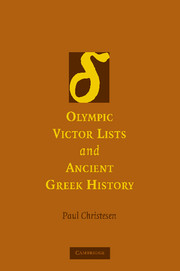Book contents
- Frontmatter
- Contents
- List of Illustrations
- List of Tables
- Preface
- A Note on Terminology, Transliterations, and Editions
- 1 An Introduction to Olympic Victor Lists
- 2 Hippias of Elis and the First Olympic Victor List
- 3 Olympionikon Anagraphai and Standard Catalogs of Olympic Victors
- 4 Olympiad Chronographies
- 5 Olympiad Chronicles
- 6 Conclusion
- Appendices
- 1.1 Scopas
- 1.2 Tiberius Claudius Polybius
- 1.3 Aristodemus of Elis
- 2 Hippias of Elis
- 3.1 Aristotle's Olympionikon Anagraphe
- 3.2 Eratosthenes' Olympionikon Anagraphe
- 3.3 The Aristotelian Pythionikai
- 3.4 POxy II 222
- 3.5 IG II2 2326
- 4.1 The Eusebian Olympic Victor List
- 4.2 Timaeus of Tauromenium
- 4.3 Dionysius of Halicarnassus
- 5.1 Philochorus
- 5.2 Ctesicles
- 5.3 Diodorus Siculus
- 5.4 Castor of Rhodes
- 5.5 Dionysius of Halicarnassus
- 5.6 Thallus
- 5.7 Phlegon
- 5.8 POxy XVII 2082
- 5.9 POxy I 12
- 5.10 Cassius Longinus
- 5.11 Dexippus
- 6 A Catalog of Olympic Victors Before Hippias?
- 7 Aristotle on the Foundation of the Olympic Truce and of the Olympic Games
- 8 Olympiads and Pankration Victors in Thucydides
- 9 More on the Accuracy of Hippias' Olympic Victor Catalog
- 10 The Olympic Victor List and the First Messenian War
- 11 Memorization and the olympic victor list
- 12 Hippias' Calculation of the Date of 776
- 13 The Spartan King Lists
- 14 Variant Olympiad Dating Systems
- 15 Menaechmus of Sicyon's Pythikos
- 16 The Sicyonian Anagraphe
- 17 Relationships between Olympionikai
- Bibliography
- General Index
- Index Locorum
11 - Memorization and the olympic victor list
Published online by Cambridge University Press: 23 November 2009
- Frontmatter
- Contents
- List of Illustrations
- List of Tables
- Preface
- A Note on Terminology, Transliterations, and Editions
- 1 An Introduction to Olympic Victor Lists
- 2 Hippias of Elis and the First Olympic Victor List
- 3 Olympionikon Anagraphai and Standard Catalogs of Olympic Victors
- 4 Olympiad Chronographies
- 5 Olympiad Chronicles
- 6 Conclusion
- Appendices
- 1.1 Scopas
- 1.2 Tiberius Claudius Polybius
- 1.3 Aristodemus of Elis
- 2 Hippias of Elis
- 3.1 Aristotle's Olympionikon Anagraphe
- 3.2 Eratosthenes' Olympionikon Anagraphe
- 3.3 The Aristotelian Pythionikai
- 3.4 POxy II 222
- 3.5 IG II2 2326
- 4.1 The Eusebian Olympic Victor List
- 4.2 Timaeus of Tauromenium
- 4.3 Dionysius of Halicarnassus
- 5.1 Philochorus
- 5.2 Ctesicles
- 5.3 Diodorus Siculus
- 5.4 Castor of Rhodes
- 5.5 Dionysius of Halicarnassus
- 5.6 Thallus
- 5.7 Phlegon
- 5.8 POxy XVII 2082
- 5.9 POxy I 12
- 5.10 Cassius Longinus
- 5.11 Dexippus
- 6 A Catalog of Olympic Victors Before Hippias?
- 7 Aristotle on the Foundation of the Olympic Truce and of the Olympic Games
- 8 Olympiads and Pankration Victors in Thucydides
- 9 More on the Accuracy of Hippias' Olympic Victor Catalog
- 10 The Olympic Victor List and the First Messenian War
- 11 Memorization and the olympic victor list
- 12 Hippias' Calculation of the Date of 776
- 13 The Spartan King Lists
- 14 Variant Olympiad Dating Systems
- 15 Menaechmus of Sicyon's Pythikos
- 16 The Sicyonian Anagraphe
- 17 Relationships between Olympionikai
- Bibliography
- General Index
- Index Locorum
Summary
W. K. Pritchett has recently argued that officials in Argos memorized the list of priestesses of Hera at Argos, and it is worth considering whether officials at Olympia might have memorized the names of Olympic victors (and then transmitted those names to Hippias). The two key pieces of evidence that are typically highlighted in regard to the memorization of information in Archaic Greece are the Homeric rhapsodes, who were clearly capable of considerable feats of memory, and the existence of officially appointed mnemones in many Greek communities. The parallels with the Olympic victor list, however, are inexact in both cases. The accurate transmission of substantial amounts of memorized information over the course of multiple generations was a time-consuming undertaking and only the most important information could receive this treatment. As Astrid Möller and Nino Luraghi point out, “a society as such does not remember for the sake of remembering: the image of the past plays a role in the legitimation, justification, reconciliation and transformation of persons, groups or social structures.”
The Homeric rhapsodes memorized great literary works that reflected and expressed many of the fundamental values that defined Greek culture. Mnemones were magistrates who carried out a number of functions, including the preservation, either in memory or in writing, of laws and judicial decisions. The operation of the legal system was a critical part of the functioning of Greek communities, particularly after the formation of more centralized political units in the eighth century, and it is easy to see why communities would have invested time and energy in maintaining a record of the basic structuring principles on which that system operated—laws and precedents.
- Type
- Chapter
- Information
- Olympic Victor Lists and Ancient Greek History , pp. 488 - 490Publisher: Cambridge University PressPrint publication year: 2007



